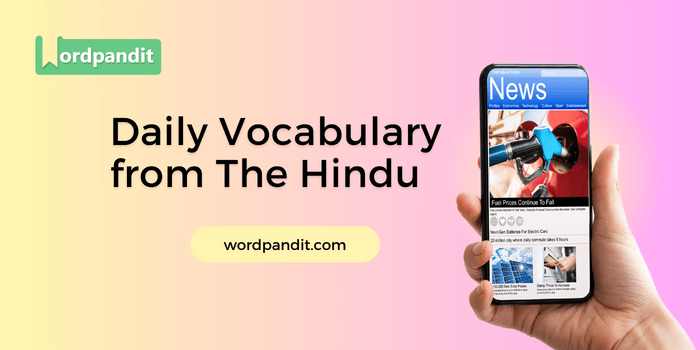Daily Vocabulary Words: List of Daily Used Words
Hi there. Welcome to this special section @ Wordpandit.
Our endeavour here is straightforward: highlighting important daily vocabulary words, you would encounter in The Hindu. This is your repository of commonly used words; essentially, we are posting a list of daily used words. Hence, this has significant practical application as it teaches you words that are commonly used in a leading publication such as The Hindu.
Visit the website daily to learn words from The Hindu.
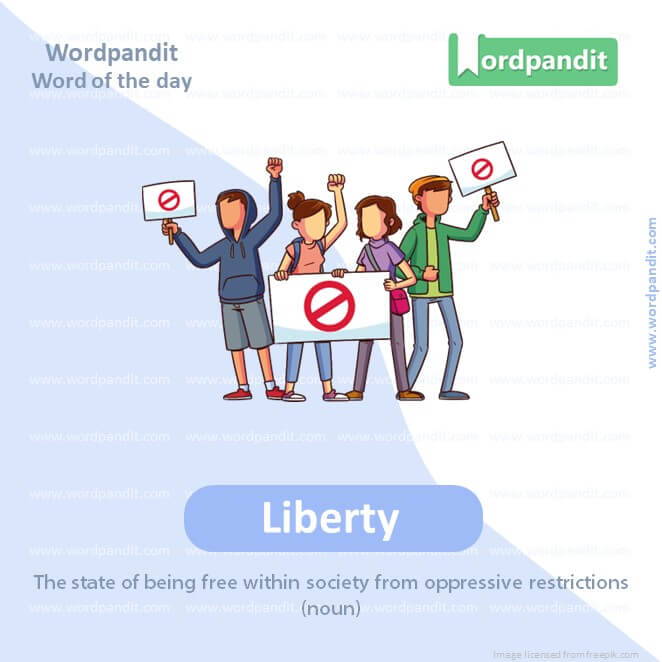
WORD-1: Liberty
CONTEXT: Samuel Johnson, a profound literary critic and essayist, wrote, Poverty is a great enemy to human happiness; it certainly destroys liberty, and it makes some virtues impracticable, and others extremely difficult. In sharp contrast, conventional measures of poverty in terms of income are limited and narrowly focused on scarcity of resources to eke out a bare subsistence. But there is much more to poverty than a bare subsistence, as emphasized by Johnson and others.
SOURCE: The Hindu
EXPLANATORY PARAGRAPH: Liberty is like being free to do things, like choosing your own clothes or playing with your friends.
MEANING: The state of being free within society from oppressive restrictions (Noun).
PRONUNCIATION: lib-er-tee
SYNONYMS: Freedom, Independence, Autonomy, Rights, Free will
USAGE EXAMPLE:
1. People fought for liberty and justice.
2. Liberty allows us to express our opinions.
3. The statue is a symbol of liberty.
4. She valued her personal liberty highly.
WORD-2: Virtues
CONTEXT: Samuel Johnson, a profound literary critic and essayist, wrote, Poverty is a great enemy to human happiness; it certainly destroys liberty, and it makes some virtues impracticable, and others extremely difficult. In sharp contrast, conventional measures of poverty in terms of income are limited and narrowly focused on scarcity of resources to eke out a bare subsistence. But there is much more to poverty than a bare subsistence, as emphasized by Johnson and others.
SOURCE: The Hindu
EXPLANATORY PARAGRAPH: Virtues are like being really good and doing the right thing, like being honest or kind.
MEANING: Qualities that are morally good or desirable (Noun).
PRONUNCIATION: ver-choos
SYNONYMS: Goodness, Morality, Integrity, Righteousness, Ethics
USAGE EXAMPLE:
1. Honesty is one of the important virtues.
2. He was known for his virtues and kindness.
3. Learning about virtues is part of growing up.
4. She admired the virtues of her role model.
WORD-3: Conventional
CONTEXT: Samuel Johnson, a profound literary critic and essayist, wrote, Poverty is a great enemy to human happiness; it certainly destroys liberty, and it makes some virtues impracticable, and others extremely difficult. In sharp contrast, conventional measures of poverty in terms of income are limited and narrowly focused on scarcity of resources to eke out a bare subsistence. But there is much more to poverty than a bare subsistence, as emphasized by Johnson and others.
SOURCE: The Hindu
EXPLANATORY PARAGRAPH: Conventional means doing things in a way that most people do, like going to bed at a regular time every night.
MEANING: Following traditional ways or standards (Adjective).
PRONUNCIATION: con-ven-shun-al
SYNONYMS: Traditional, Standard, Usual, Orthodox, Customary
USAGE EXAMPLE:
1. They chose a conventional wedding ceremony.
2. Conventional farming uses a lot of chemicals.
3. His views are quite conventional.
4. It was a conventional design for the house.
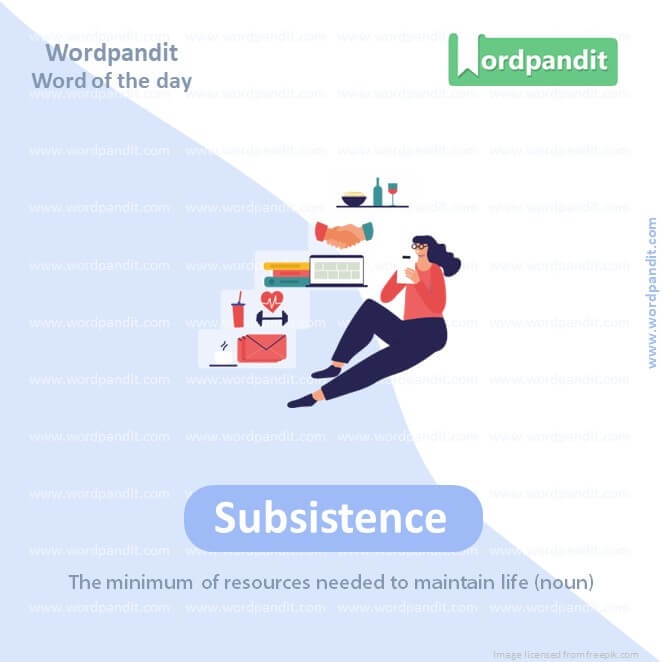
WORD-4: Subsistence
CONTEXT: Samuel Johnson, a profound literary critic and essayist, wrote, Poverty is a great enemy to human happiness; it certainly destroys liberty, and it makes some virtues impracticable, and others extremely difficult. In sharp contrast, conventional measures of poverty in terms of income are limited and narrowly focused on scarcity of resources to eke out a bare subsistence. But there is much more to poverty than a bare subsistence, as emphasized by Johnson and others.
SOURCE: The Hindu
EXPLANATORY PARAGRAPH: Subsistence is like having just enough of what you need to live, like food and a home.
MEANING: The minimum of resources needed to maintain life (Noun).
PRONUNCIATION: sub-sis-tence
SYNONYMS: Survival, Existence, Livelihood, Sustenance, Maintenance
USAGE EXAMPLE:
1. Many families live at a subsistence level.
2. Subsistence farming provides just enough for the farmer’s family.
3. They depended on fishing for subsistence.
4. The grant ensured their basic subsistence.
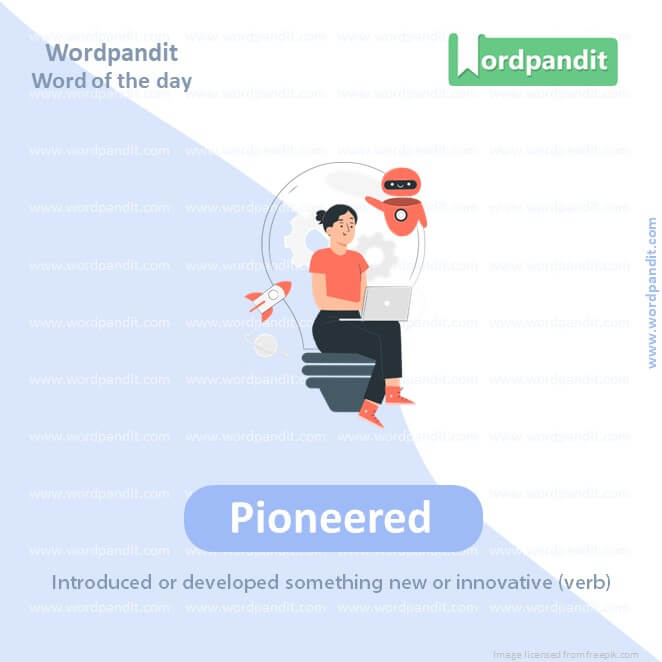
WORD-5: Pioneered
CONTEXT: Nobel Laureate Amartya Sen pioneered a rich, innovative, and broader perspective on well-being, focusing on capabilities and functionings. While capabilities are abilities to do this or that in a free and fair environment, functionings reflect achievements. An ability to live a healthy life, for example, is not necessarily related to affluence as it could result in obesity and vulnerability to non-communicable diseases. Achievements such as being healthy, on the other hand, require a nourishing diet and physical exercise. Professor Sen has, however, resisted aggregation of concepts such as capabilities into an overall measure of well-being as he believes that each capability is important in itself.
SOURCE: The Hindu
EXPLANATORY PARAGRAPH: Pioneered is like being the first one to do something or discover something new, like creating a new game.
MEANING: Introduced or developed something new or innovative (Verb).
PRONUNCIATION: pi-o-neered
SYNONYMS: Innovated, Initiated, Led the way, Trailblazed, Originated
USAGE EXAMPLE:
1. She pioneered a new technique in surgery.
2. The company pioneered the use of renewable energy.
3. He pioneered research in this field.
4. Pioneered methods are often celebrated.
WORD-6: Perspective
CONTEXT: Nobel Laureate Amartya Sen pioneered a rich, innovative, and broader perspective on well-being, focusing on capabilities and functionings. While capabilities are abilities to do this or that in a free and fair environment, functionings reflect achievements. An ability to live a healthy life, for example, is not necessarily related to affluence as it could result in obesity and vulnerability to non-communicable diseases. Achievements such as being healthy, on the other hand, require a nourishing diet and physical exercise. Professor Sen has, however, resisted aggregation of concepts such as capabilities into an overall measure of well-being as he believes that each capability is important in itself.
SOURCE: The Hindu
EXPLANATORY PARAGRAPH: Perspective is like the way you see things or think about them, like thinking your big toy is more fun than your small one.
MEANING: A particular attitude or way of viewing something (Noun).
PRONUNCIATION: per-spec-tive
SYNONYMS: Viewpoint, Outlook, Standpoint, Angle, Approach
USAGE EXAMPLE:
1. Everyone has their own perspective.
2. The book offers a new perspective on history.
3. Seeing things from another’s perspective is important.
4. Art class taught us about perspective in drawing.
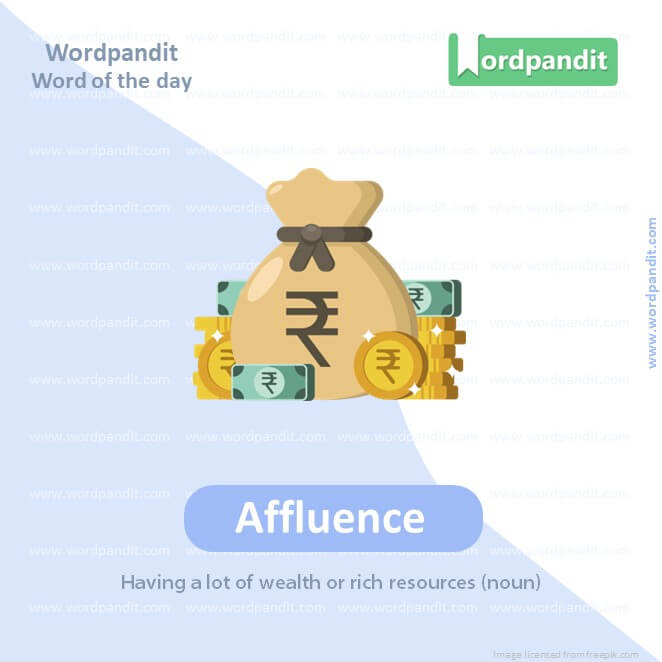
WORD-7: Affluence
CONTEXT: Nobel Laureate Amartya Sen pioneered a rich, innovative, and broader perspective on well-being, focusing on capabilities and functionings. While capabilities are abilities to do this or that in a free and fair environment, functionings reflect achievements. An ability to live a healthy life, for example, is not necessarily related to affluence as it could result in obesity and vulnerability to non-communicable diseases. Achievements such as being healthy, on the other hand, require a nourishing diet and physical exercise. Professor Sen has, however, resisted aggregation of concepts such as capabilities into an overall measure of well-being as he believes that each capability is important in itself.
SOURCE: The Hindu
EXPLANATORY PARAGRAPH: Affluence is when people have a lot of money and nice things, like a big house and a fancy car.
MEANING: Having a lot of wealth or rich resources (Noun).
PRONUNCIATION: af-loo-ence
SYNONYMS: Wealth, Richness, Prosperity, Opulence, Wealthiness
USAGE EXAMPLE:
1. The neighborhood was known for its affluence.
2. Affluence allowed them to travel the world.
3. With affluence comes responsibility.
4. The study focused on affluence and happiness.
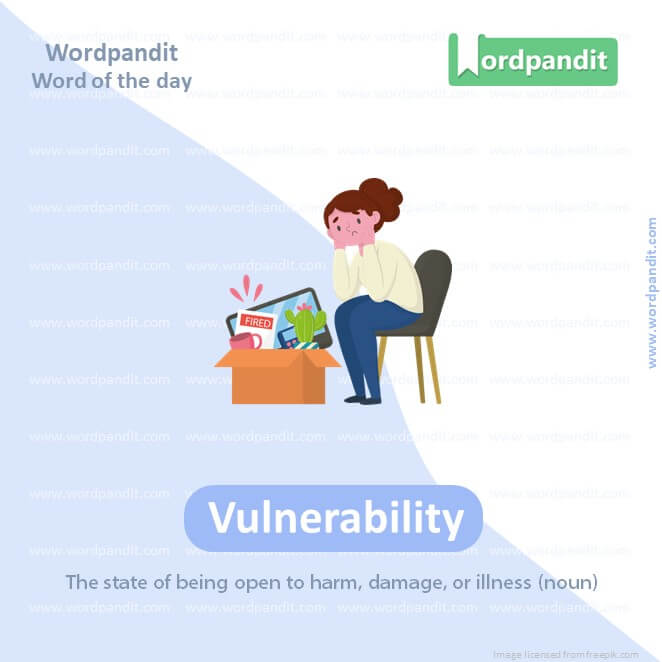
WORD-8: Vulnerability
CONTEXT: Nobel Laureate Amartya Sen pioneered a rich, innovative, and broader perspective on well-being, focusing on capabilities and functionings. While capabilities are abilities to do this or that in a free and fair environment, functionings reflect achievements. An ability to live a healthy life, for example, is not necessarily related to affluence as it could result in obesity and vulnerability to non-communicable diseases. Achievements such as being healthy, on the other hand, require a nourishing diet and physical exercise. Professor Sen has, however, resisted aggregation of concepts such as capabilities into an overall measure of well-being as he believes that each capability is important in itself.
SOURCE: The Hindu
EXPLANATORY PARAGRAPH: Vulnerability is when you can get hurt easily, like being really upset when someone says something mean.
MEANING: The state of being open to harm, damage, or illness (Noun).
PRONUNCIATION: vul-ner-a-bil-i-ty
SYNONYMS: Susceptibility, Exposed, Defenselessness, Weakness, Risk
USAGE EXAMPLE:
1. She spoke about her vulnerability openly.
2. Children’s vulnerability makes them need protection.
3. The report highlighted the system’s vulnerability.
4. Vulnerability can lead to growth.
WORD-9: Nourishing
CONTEXT: Nobel Laureate Amartya Sen pioneered a rich, innovative, and broader perspective on well-being, focusing on capabilities and functionings. While capabilities are abilities to do this or that in a free and fair environment, functionings reflect achievements. An ability to live a healthy life, for example, is not necessarily related to affluence as it could result in obesity and vulnerability to non-communicable diseases. Achievements such as being healthy, on the other hand, require a nourishing diet and physical exercise. Professor Sen has, however, resisted aggregation of concepts such as capabilities into an overall measure of well-being as he believes that each capability is important in itself.
SOURCE: The Hindu
EXPLANATORY PARAGRAPH: Nourishing is like eating food that makes you strong and healthy, like fruits and vegetables.
MEANING: Providing the nutrients needed for growth and health (Adjective).
PRONUNCIATION: nur-ish-ing
SYNONYMS: Nutritious, Healthy, Wholesome, Beneficial, Sustaining
USAGE EXAMPLE:
1. The soup is very nourishing.
2. She looked for nourishing recipes for her family.
3. A nourishing breakfast starts the day right.
4. Vegetables are part of a nourishing diet.
WORD-10: Replicated
CONTEXT: Unfortunately, the United Nations Development Programme (UNDP) seized upon capabilities to construct an overall measure of human development with uniform weights of the three components: health, education and standard of living and their sub-indices. Following this methodology, NITI Aayog and the UNDP released recently a National Multidimensional Poverty Index/MPI: A Progress Review 2023, also replicated in the UNDP Report, Making Our Future: New Directions for Human Development in Asia and the Pacific, released on November 7, 2023.
SOURCE: The Hindu
EXPLANATORY PARAGRAPH: Replicated is like making an exact copy of something, like drawing the same picture as your friend.
MEANING: Copied or reproduced exactly (Verb).
PRONUNCIATION: rep-li-cat-ed
SYNONYMS: Duplicated, Copied, Imitated, Cloned, Reproduced
USAGE EXAMPLES:
1. The experiment was replicated in different labs.
2. They replicated the famous painting.
3. The design was replicated for the new model.
4. The success of the project could not be easily replicated.
Vocabulary Daily Words
Among the myriad aspects of language learning, the role of ‘vocabulary daily words’ attests to their undeniable importance. These everyday words form the bedrock of communication. Whether used in casual chat or formal discussion, the fluency and understanding of ‘vocabulary daily words’ can significantly uplift the quality of interaction. However, the vital question is, how to effectively learn these ‘vocabulary daily words’?
The crux of learning ‘vocabulary daily words’ lies in a well-rounded approach that encompasses exposure, understanding, memorization, and practice. Rote memorization might seem like a quick solution, but it lacks context and, thereby, retention. Hence, opt for a diverse range of resources like books, newspapers, podcasts, and digital media. These will bring ‘vocabulary daily words’ to life, providing real-life usage examples and making the learning process inherently engaging.
Next, using memory-enhancing techniques can significantly improve retention of ‘vocabulary daily words’. Techniques such as flashcards or the Leitner System align with the principles of spaced repetition, allowing more effective and long-term learning. Incorporating mnemonic devices, associating new words with unique stories or images, can further facilitate this learning process.
The key to fully grasping ‘vocabulary daily words’ lies in practical usage. Make it a habit to use these words in your daily communications. Whether it’s a friendly conversation, a professional email, or a social media post, try integrating these new words. Doing so provides hands-on practice, strengthening your comprehension and application of these words.
In a nutshell, ‘vocabulary daily words’ are a treasure in the language learning landscape. By harnessing diversified resources, utilizing memory techniques, and actively using these words, your grip on the ‘vocabulary daily words’ will strengthen significantly. So, turn the pages, hit play, start a conversation, and let these ‘vocabulary daily words’ shape the story of your linguistic journey.

